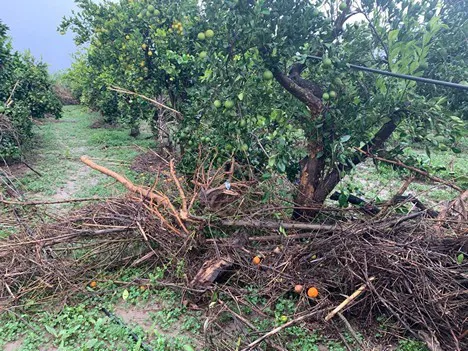"Our thoughts are with those who have suffered damages to their farms and homes, but we are particularly saddened by the loss of human lives. The exceptional bad weather conditions have hit the production area of Sicily’s Blood Oranges in full, causing damages that are not yet quantifiable to production and citrus groves," said Elena Albertini, vice-president of the Consortium for the Protection of Sicily's Blood Oranges PGI.
 Elena Albertini
Elena Albertini
"We have to wait for the end of this Mediterranean cyclone, also called Medicane, before we can start assessing the extent of the damages, but we can already say that for the area where blood oranges are grown, there will be a need for concrete and immediate support from the government to provide financial assistance to all growers. It is also necessary to ensure that weather conditions of this magnitude can have less impact through proper management of the water network."
This disaster has been described by many as much worse than that of 2018, for which growers are still paying off accumulated debts for repairs.
"Up until a few days before Medicane, we were preparing forecasts for the harvest that was expected to start by the end of the year. It is still early to make precise statements, but production has definitely been lost on the plots that are submerged by water," says the vice-president. "The damage is enormous. And apart from the bad weather, less fruit was already expected due to an off-year and the dry summer. However, we have been able to overcome the heat to a large extent thanks to expensive interventions such as emergency irrigation. And despite the fact that huge amounts of irrigation water have evaporated due to the high temperatures (above 45°C), the blood oranges still looked very good up until a few days ago, of excellent quality and with large sizes."

"Over the coming days we will have a better view of the situation for the Sicilian orange crop and for blood oranges in particular. Blood orange cultivation covers an area of about 45,000 hectares in the provinces of Catania, Syracuse and Enna. We will also have to see what our position on the international markets is now that Spain expects some 10% less citrus and Turkey and Israel some 20% more. Furthermore, we will have to take into account the price increases of raw materials, energy and logistics, which in our case is mostly road transport," explained Albertini.
"In the light of this not very encouraging scenario, we have the duty, as a Consortium, to inform the supply chain, supermarket chains and consumers about the huge sacrifice made by growers to supply quality oranges. We want to draw attention to what it means to choose an Italian orange. It is choosing quality and the survival of a sector," concluded the Vice-President.
For more information:
Elena Albertini 
Consorzio di Tutela
Arancia Rossa di Sicilia IGP
Via San Giuseppe la Rena 30/B
95121 Catania (CT) - Italy
+39 095 507681
C/o MAAS Corpo B Catania
[email protected]
www.tutelaaranciarossa.it
